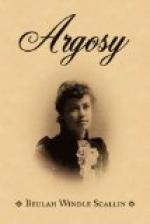We had been strongly recommended to the Hotel d’Europe, as strongly cautioned against any other; but we found that the omnibus was not at the station; nor any flys; nothing but the omnibus of a small hotel we had never heard of, in charge of a conductor, rough, uncivil, and less than half sober.
This conductor—who was also the driver—declined to take us to any other hotel than his own; would listen to no argument or reason. Had he been civil, we might have accepted the situation, but it seemed evident that an inn employing such a man was to be avoided. Unwilling to be beaten, we sought the station-master and his advice.
“Why is the omnibus of the Hotel d’Europe not here?” we asked.
“No doubt the hotel is full. It is the moment of the great fair, you know.”
But we did not know. We knew of Leipzig Fair by sad experience, of Bartholomew Fair by tradition, of the Fair of Novgorod by hearsay; but of Morlaix Fair we had never heard.
“What is the fair?” we asked, with a sinking heart.
“The great Horse Fair,” replied the station-master. “Surely you have heard of it? No one ever visits Morlaix at the time of the fair unless he comes to buy or sell horses.”
Having come neither to buy nor sell horses, we felt crushed, and hoped for the deluge. I proposed to re-enter the train and let it take us whither it would—it mattered not. H.C. calmly suggested suicide.
“What is to be done?” he groaned. “The man refuses to take us to the Hotel d’Europe. He is not sober; it is useless to argue with him.”
“The fair again,” laughed the official. “It is responsible for everything just now, and Bretons are not the most sober people at the best of times. Still, if you wish to go to the Hotel d’Europe, the man must take you. There is no other conveyance and he is bound to do so. But I warn you that it will be full, or the omnibus would have been here.”
Turning to the man, he threatened to report him, gave him his orders, and said he should inquire on the morrow how they had been carried out. We struggled into the omnibus, which was already fairly packed with men who looked very much like horsedealers, the surly driver slammed the door, and the station-master politely bowed us away.
The curtain dropped upon Act I.; Comedy or Tragedy as the event might prove.
It soon threatened to be Tragedy. The omnibus tore down a steep hill as if the horses as well as the driver had been indulging, swayed from side to side and seemed every moment about to overturn. Now the passengers were all thrown to the right of the vehicle, now to the left, and now they all collided in the centre. The enraged driver was having his revenge upon us, and we repented our boldness in trusting our lives in his hands. But the sturdy Bretons accepted the situation so calmly that we felt there must still be a chance of escape.
So it proved. In due time it drew up at the Hotel d’Europe with the noise of an artillery waggon, and out came M. Hellard, the landlord. His appearance, with his white hair and benevolent face, was sufficient to recommend him, to begin with. We felt we had done wisely, and made known our wants.




